#cultural christianity
Explore tagged Tumblr posts
Text
Btw, that idea that privilege makes you morally evil and suffering makes you morally good is just repackaged versions of the Christian concepts of the evils of luxury and the holiness of martyrdom. Hope this helps!
26K notes
·
View notes
Text
So, you know how certain Christian missionaries are trained to act in a very obnoxious way, so that most people they preach to will reject them outright, so they feel like the world hates them for being Christian and they can only be friends with fellow Christians? You know that thing?
I think as activists, we sometimes need to stop and ask ourselves whether we're acting like those missionaries. I think this type of behavior is a little more ingrained into our society than some of us realize, and some of us have internalized it without realizing what it's actually meant to do.
29K notes
·
View notes
Text
'Tis the season to unpack some stuff about Christmas from a minority perspective:
Christmas is a Christian holiday. The fact that many celebrate it in an irreligious way (which is valid!) does not change its origins, connotations, symbolism, nor what it has historically meant for religious minorities.
The idea that Christmas is "secular" (read: neutral) is a product of Christian hegemony and the blindness of many in Christian countries to the permeation of Christianity as "default" culture.
When someone says they don't celebrate Christmas since it's a Christian holiday, it is not actually reassuring or helpful to say something along the lines of "oh well it's just a secular day of family & presents for everyone! So you can celebrate it too!"
Though the above statement is usually well-intentioned, it is often distressing to hear because it is untrue and is erasing our lived experiences. The reflexive effort to make Christmas universal is a cultural reverberation of the millennia-old evangelizing effort to make Christianity universal, and as such, can be very uncomfortable for religious minorities.
#christmas#christianity#cultural christianity#culturally christian#christmas season#christian hegemony#supersessionism#minority experiences#jewish#jumblr#jewblr#being jewish#judaism#religious minorities#the jewish experience#christian culture#christmas time#the holidays#holiday season#jews#jewish life#tis the season
19K notes
·
View notes
Text
alrighty folks buckle up for the fifth year of menorabilia ratings! I've scoured the internet (and my eyeballs) so get ready for the best and worst chanukah merchandise of the year

okay first I just need to get these fuckin gnomes out of the way. ideally permanently. this guy's hat has so much going on I don't know where to begin. the menorah? not kosher. also wrong. the dreidels? certainly have,,, something written on them. everyone knows reindeer love chanukah, the lighting fires holiday. 5/10 at least it's got SOMEWHAT of a cuteness factor
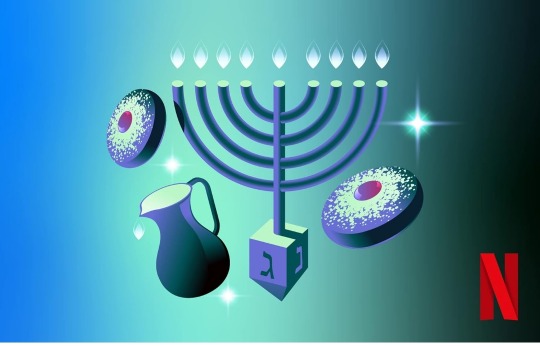
turning old CDs into fake sufganiyot is certainly creative bc that's the only explanation for those monstrosities that I'll accept. please don't spin your spontaneous combustion menorahs on top of your dreidels. it won't bring the next season any faster. 4/10 I'll put up with a lot if you're offering to pay for my netflix account

they are Setting That Torah On Fire. is that why there's an oil jug next to a candle menorah. 6/10 the פ instead of a ש on the dreidel is because the miracle is just the torah not bursting into flames
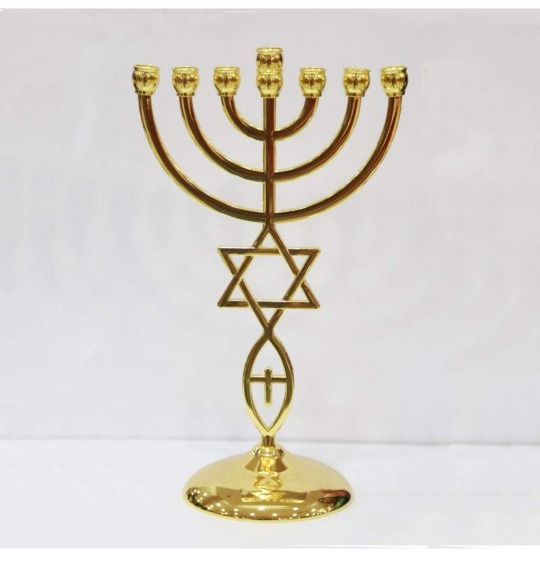
this really puts the messy in messianic. it's got the wrong amount of branches. why is the shamash just two stacked cups. the cross looks like an airplane. oh god it also has the jesus fish. -76162802492/10 never knew a single image could contain so much No.

some of these menorahs are kosher and some are not which really spices things up. what a fun little game of I spy for me. I enjoy the addition of various happy animals celebrating chanukah but were the santa hats really necessary? 7/10 that bottom dreidel has two נs. none dreidel with left coins.

I can acknowledge that it's an attempt to jewish-ize a christmas thing but tinsel is, unfortunately, occasionally, pretty. weird choice to have all the menorahs have נs but sure. what's that? those are dreidels? wrong. take a look at the helpful next image of this item.
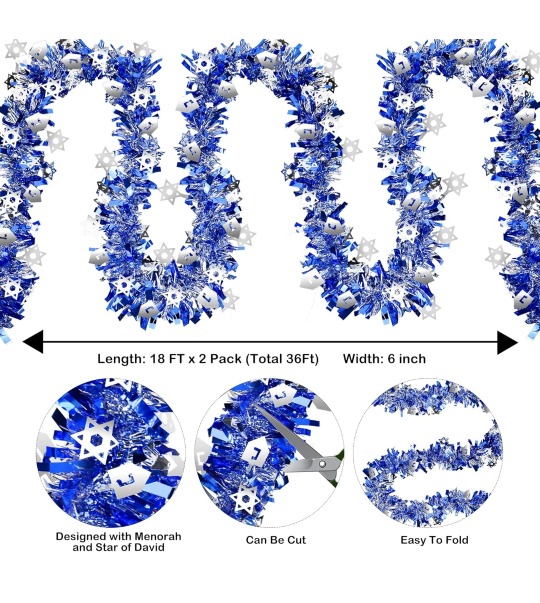
do you see it yet? here let me help.
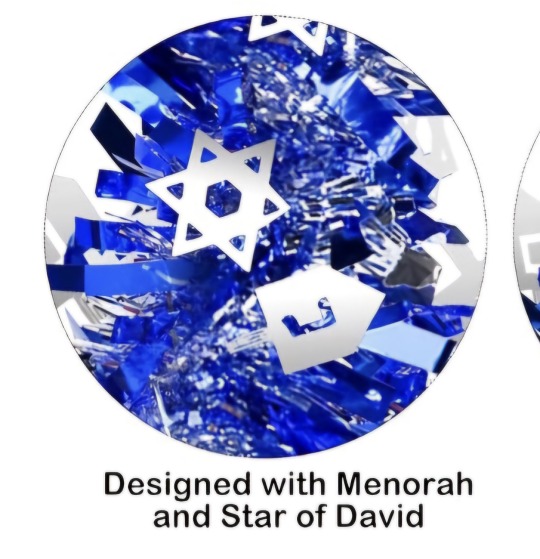
clearly those are menorahs. we light them on fire and spin them as fast as we can. first one to die loses. 5/10 google is your friend
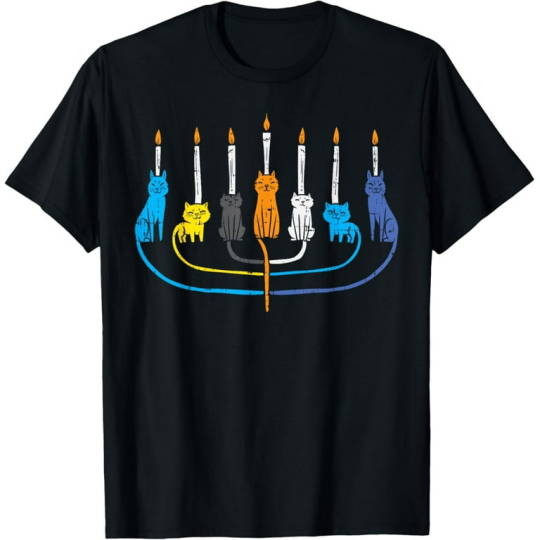
move over fiddler on the roof chassidim with bottle balancing skills, here come some cats with impressive candle dexterity. this may not be a kosher menorah but their TAILS are the BRANCHES. 7/10 I am easily won over by the presence of cats okay

canon jewish representation, a spinning dreidel, a kosher menorah, some chocolate gelt, and they're eating fresh latkes. I needed these yesterday. 10/10 rugrats my beloved never lets me down
(previous years 1, 2, 3, 4)
#here it is!#man there is. So Much terrible stuff out there#every year im so grateful for the good ones i encounter because#the bad ones are BAD#anyway enjoy!#chanukah#lol#hanukkah#jewish humor#judaism#jewish holidays#chanukah ratings#chanukah ratings 2024#jumblr#cultural christianity
3K notes
·
View notes
Text
Just because your church was a cult it doesn’t mean my synagogue is one
1K notes
·
View notes
Text
Some ramble that has been on my mind lately.
I’m a huge fan of John Finnemore’s writing and sketches. If you don’t know who he is, he’s an English comedy writer. He’s born and raised in the UK. And he has a radio sketch show called “John Finnemore’s Souvenir Programme” it’s a hilarious show and I highly recommend it. It’s made me laugh and honestly been a bright spot in dark times.
Occasionally, he has what he calls “meta sketches” where one person from the cast (there are five comedians in the JFSP cast) will address him about something in another sketch or make fun of him or something. And in one sketch, he pokes fun at Christianity. In the following meta-sketch, a cast member asks why he always makes fun of Christianity but not any other religion. And John responds with that Christianity is the religion he knows. He was born and raised in it and while he’s not a Christian, he recognizes how Christianity shapes British culture and always has. And it wouldn’t feel right to make fun of a religion he isn’t part of, and knows nothing about.
Then he says “actually the only other religion I know anything about is Judaism. And actually I’ve been thinking of a sketch idea based on a man I saw in London on a Saturday at a crossing patiently waiting for someone else to press the button so god wouldn’t he cross with him for working. And he’s perfectly right to believe that, but you can’t pretend there isn’t something a little funny about that.” And the sketch moves on.
This is the thing I’ve been thinking of. He said “the religion I know anything about would be Judaism” and then immediately in the *very next sentence* demonstrates a fundamental lack of knowledge about Judaism. In that “god would be cross with him for working” in that one sentence, he demonstrates so *clearly* the cultural Christianity that permeates western culture.
Because mostly…Jews *don’t* (can’t speak for all Jews obviously) believe G-d would be “cross at us” for violating the laws of Shabbat. We follow the laws out of a place of love. Not fear. We follow the laws because we believe they are part of the covenant G-d made with the Jewish people. We don’t believe in divine retribution. Like an orthodox Jewish woman I used to follow when I had TikTok said in a video, “if we break a commandment we don’t believe G-d is gonna strike us down or anything. We just acknowledge that we broke the commandment, say sorry, and then move on and try not to do it again.” And she has answered that question *numerous times* in numerous videos.
And Christians and former Christian’s have demonstrated time and time again that they fundamentally do not understand this. I was raised Christian. Catholic to be exact. And let me tell you, it’s fear. Not love that drives a lot of their rule following. Fear of going to hell and spending eternity being tortured and separated from g-d is a very real thing. They legit have something called “mortal sins” and missing Sunday Mass is one of them.
Because Judaism is a religion of orthopraxy. Not orthodoxy. In Judaism, what you do matters far far more than what you believe. You can be an atheist and an Orthodox Jew. Hell, I don’t eat pork. Do I think G-ds gonna be mad at me for eating bacon? No. Of course not. I don’t even really know if I believe in a G-d like that. I sorta flip flop between agnosticism and like a pantheist view. I don’t eat pork because I am a Jew. And it’s a commandment I chose to take on. Because I love being Jewish. Not out of fear.
Now I’m not saying this to hate on John Finnemore. Like I said. I am a huge fan of his work. I absolutely love Cabin Pressure, and JFSP, and Double Acts and just about anything else he’s written. I’m just saying this because it is clearly demonstrates the cultural Christian lens through which that people here in the west, including former Christian’s and now atheists like JF see the world.
So basically what I’m saying is that just because Judaism was the religion that Christianity sprang from, and you grew up Christian or even just in a Christian country in the west, does not mean that you know anything about us. It’s so easy to think you understand what Judaism is about because you’ve read “the Old Testament” and seen Fiddler on the Roof or something. And yet get even incredibly basic facts about Jewish worldview wrong because you haven’t grasped that Jews see the world completely differently. (Not to mention that 2000 years separate the split from Judaism of Christianity and Judaism developed and evolved on its own ever since. It’s a total and separate religion. But Christians tend to think we’re the exact same we were 2000 years ago. Which is why their minds are *blown* when we say that to us, Jesus is as irrelevant as Thor is. We literally do not care about your special boy. He may have been a Jew, but like…he’s a dude that lived over 2000 yrs ago.)
So basically what I’m saying is that if you are not Jewish, or at least put in serious work to learn about us, from us, you don’t actually know about Judaism like you think you do. Cultural Christianity permeates everything here in the west, and it’s a lot to unpack and unlearn.
187 notes
·
View notes
Text
Cultural Christianity: Some Thoughts
The question of whether someone can be both an atheist and a Christian is relevant only in some very specific contexts. In theocratically Christian countries (which has been the normative way to Do Government in Christendom for most of its history), apostasy is literally a crime; if you're an atheist in one of those places you're probably going to keep your mouth shut about it and if you do open it you can expect to be repudiated by your former community.
In countries that aren't theocratically Christian, Christianity frequently functions at least in part as an ethnic indicator. In Northern Ireland it makes sense to ask an atheist whether she's a Catholic or a Protestant atheist. In places where Christians are a minority, they are frequently an ethnic minority, and that will be bound up in their culture.
The only places where the question is relevant are some culturally Christian countries that are not theocratic and where for the most part Christian membership is not ethnically marked. In the United States (which is what I'll be focusing on), that means white American Protestants. (And not even all of them. A born-in Jehovah's Witness may be a white American Protestant, but her culture is definitely not the dominant Christian culture in this country.)
One of the weirder things about this debate, to me, is that on tumblr this debate seems to be largely between gentile atheists and Jews. It's not something I see coming from Muslims, Buddhists, Hindus, or Sikhs. It's definitely not something that Christians care about.
As far as I can tell, no one is arguing that the United States is not dominated by (white American Protestant) Christian culture or that everyone who lives here is not to some degree affected by that. The debate seems very much to be about whether a specific person can (or should) be called a cultural Christian.
There are, obviously, some atheists who accept the label. Richard Dawkins is the obvious example (and I'd argue that Dawkins' embrace of the label should give people pause in applying it to others). Those atheists are not part of the debate. They have already been convinced that the term can (and should) be applied to them.
Notably missing from the debate is whether members of other religious minorities can (or should) be called cultural Christians. If I'm raised a Reform Jew in a Christian-majority area and go to a public school, I will be almost as exposed to Christian culture as someone raised a Methodist. But no one is arguing that assimilated or partially-assimilated Jews (and I'd argue that almost all non-Haredim are to some extent partially assimilated) should be called cultural Christians.
The atheists have noticed that. And they really don't like it. The implication it carries is that anyone raised (white American Protestant) Christian will remain so, unless they convert to a different religion and atheism doesn't count.
But the fact that it rankles doesn't mean it's not true. However, it does mean that a lot of atheists see the application of the term to themselves as a denial of their atheism and of the significant work it took to leave Christianity. Because in the United States, even now, leaving Christianity is hard. In some cases it's dangerous, but more commonly it "just" means risking the loss of your entire network of friends and family. This is less so today than it was, say, forty years ago, but it's still a thing.
Further, atheists in the US are a minority religious group. One that experiences oppression and suppression by the dominant religious group. Calling an atheist a cultural Christian identifies her with the group that is actively oppressing her. Which is bound to raise some hackles.
I don't really have a conclusion here. My sense is that applying the term "cultural Christian" to people who don't like it is, at best, counterproductive and, at worst, a microaggression. It doesn't seem to be helping anybody to use it in those cases and may be counterproductive to a discussion of the hegemony white American Protestantism has over US culture. Which is a conversation that is more important now than it has been in decades.
227 notes
·
View notes
Text
I’m not saying anything new here, but I’m still going to say it:
If you want an example of how powerful Christian hegemony is, just look at how uncomfortable-to-downright-angry a lot of people who aren’t practicing Christians (one sees this a lot with atheists and neopagans) get if you float the idea that maybe Jesus was not particularly nice or wise, that the New Testament’s teachings aren’t particularly compassionate, etc.
583 notes
·
View notes
Text
My one bit of advice for anyone who's looking into a pagan or polytheistic religion, especially if coming from a Christian background and/or a culturally Christian part of the world: you've got to be ready to compartmentalize and look at different parts of the world through a not cultural Christian lens, because many parts of the world don't work that way.
The sky above isn't Heaven everywhere and beneath the earth isn't Hell everywhere. A sky god isn't God the Father everywhere and an Underworld god isn't Satan the Devil everywhere.
Learning about the cultures and the people that these religions, mythologies, and folklores come from is important.
#witches of color#witchblr#paganblr#polytheism#religions#religious people of color#cultural christianity#witches of the world
75 notes
·
View notes
Text
I think people mean well when they insist that America isn't a Christian country but it just obfuscates the situation and makes it more difficult for minorities to frame their experiences. America is a fundamentally, structurally, ideologically Christian country from top to bottom. It's exhausting, it's suffocating, and it's the truth. Nearly all political forces, pop culture phenomena, and major life philosophies here are either built on Christianity or propped up as subverting Christianity in a way that is, of course, still entirely about Christianity. Leftwing movements here that are ostensibly hostile to Christianity still ultimately structure their worldviews around their own versions of salvation, rapture, original sin, eternal judgement, heaven, and hell. Most people here fail to see Christianity all around them, influencing every facet of American life, for the same reason that a fish can't see water.
#christianity#christian hegemony#christian culture#christian imperialism#religious minorities#religion#minority perspective#the jewish experience#jewish#jumblr#jewblr#being jewish#cultural christianity#culturally christian#minority experiences#supersessionism#jewish people#jews#religious studies
14K notes
·
View notes
Text
Dear pagans, polytheists, and witches:
It is okay to celebrate Christmas.
Its okay to celebrating it as a non-Christian.
But you HAVE to accept and admit that it is a culturally Christian holiday.
In many culturally Christian countries you have to be cognizant of how Christmas is elevated above other religion's holidays.
Stop claiming every aspect of it is something stolen from ancient societies: bringing in trees, decorating with lights, gift giving— or whatever else you attribute to the "paganness" of Christmas with no legitimate sources.
Christmas was not stolen from the ancients and you cannot "reclaim it" by spreading pseudo-historical bullshit.
Just admit you will celebrate a culturally Christian holiday— its okay to admit that and move on.
[Edit: see my reblog of this for some basic sources to begin with]
[Edit 2: More info]
[Edit 3: I wrote a post about why you should accept/admit it as Culturally Christian and now that its Dec 25 I'mma just shut off reblogs for this, if you celebrated Christmas I hope you enjoyed it.]
#polytheism#paganism#helpol#witchcraft#occultism#hellenic polytheism#cultural christianity#pagan#witch#christmas#xmas holiday
660 notes
·
View notes
Text
Can we stop treating crosses like they’re non-denomination? Yes, even if it’s emo or goth. It’s still a religious symbol. You are culturally christian. That’s not a bad thing, but when you treat your culture like it’s everyone’s culture it does make people uncomfortable. I’m pretty goth sometimes. I get really uncomfortable when I look up goth stuff on pinterest and it’s all crosses. You can wear them, but when you’re an atheist with a pin that saying “fuck religions” it’s pretty fucking weird that you’re wearing cross earrings.
2K notes
·
View notes
Text
I don't really see people talking about how cultural Christianity is applied to Jews.
In Christianity, Jews are the people who rejected and betrayed Jesus and are punished with statelessness and destitution, whose only redemption is accepting the Messiah and the Son of God. This is the basis of several antisemitic tropes, most prominently deception, religious supercessionism and the Wandering Jew.
In cultural Christianity, these tropes are considered tenants of Judaism rather than Christianity, as Judaism is considered Christianity without Jesus.
Christians see themselves as tortured saints, persecuted for spreading the truth of Jesus and God across the globe. Missionaries who go to non-Christian lands to try and get the people to convert by fearmongering with damnation to Hell see themselves as victims when they're rebuffed and asked to stop.
Cultural Christian non-Christians are usually atheists and adherents of folk religion revivalist movements who have suffered religious abuse, as many sects of Christianity normalize emotional abuse by instilling inherent guilt in the Original Sin and even physical abuse in "Spare the rod; spoil the child". These cultural Christians see the millennia of antisemitism and roll their eyes, to them we're just another sect of delusional religious people with a persecution complex.
To become a Christian all you need to do is accept the Father Son and Holy Spirit, to affirm your beliefs and confess your sins. To become a Jew you are either born a Jew, or you learn the Jewish culture and religion for months on end and must live half a year under the strictest restrictions of the Jewish lifestyle to show commitment. That is the difference between a universal religion and an ethnoreligion.
In a Culturally Christian world there is no room for ethnoreligions, and they do not exist. All religions are about your faith and which God(s) you believe in. So in a Cultural Christian's eyes, a country of Jews is a country that holds one faith supreme above all others and conditions rights with conversion, as that's how Christian countries have historically been.
Christianity's common ground with Jews comes from the Roman Empire appropriating the religion from the Cult of Jesus, and making it more appealing to the masses by introducing Greco-Roman and Germanic folk religion aspects into it. Xmas is Yule but with Jesus, Easter is a fertility holiday but with Jesus and so on. In the eyes of the Cultural Christian, Christianity and Judaism are two once-antagonistic sects of the same religion, no different than Catholics and Protestants.
Cultural Christianity erases and appropriates Judaism and is as inherently hateful of Jews as religious Christianity.
Now, when it comes to the elephant in the room: Islam.
Islam, like Christianity, is a universal religion. You must believe in Allah and accept the prophets, which include both Jesus and Muhammad. It is no more inherently violent than Christianity, though it's no less. In the Christian's eyes, Islam is the competitor, the enemy. The Muslims conquered Christian lands and converted them, and they've fought holy wars against one another throughout the Middle Ages.
To become a Muslim the Cultural Christian doesn't need to unlearn any of the core tenets of their culture. They can simply apply it to Islam.
Which is why many Cultural Christians, damaged by Christianity, are sympathetic to Islam. And since Muslims and Jews are no longer on good terms, they use this sympathy to give themselves a free pass to be antisemitic. Whether Muslims check their converts for bigotry, allow it or are powerless to stop them, that's another issue.
Jews are not diet Christians. We have less in common with you than you have with Muslims. Unlearn Christian cultural appropriation.
And no, I don't care that it's "offensive" to associate you with Christianity due to the religious abuse you endured. You still see the world through a Christian lens.
#cultural christianity#christian supremacy#Christian imperialism#religious supercessionism#wandering jew#wandering Jew trope#christian antisemitism#antisemitism#leftist antisemitism
296 notes
·
View notes
Text
my most autistic trait is probably that, as someone raised by christian nationalists, I cannot STAND the cheap flimsy potshots antitheists fire at christianity. you guys are Doing It Wrong. you dont even know about the council of nicaea OR christianity's long history of antisemitism. get off the stage you're embarrassing yourself.
#morgans magical musings#cultural christianity#ex christian#text#“dae invisible sky fairy” grow up oh my GOD#jesus wasnt even a historical person! everything you know about how this religion was formed is FROM CHRISTIANS and therefore full of BS!!!#theres so much material there but no. we gotta say the old testament (aka jewish) god was a warmongering bastard. ROLLS EYES.#“the bibles only mention of abortion is how to preform one” if you seriously think this is a valid argument you have never met a christian#in your entire life. get off the stage!!!
71 notes
·
View notes
Text
So I’ve been thinking about cultural Christianity lately and how people tend to get very upset about it without really understanding what it is, so here is a primer
Cultural Christianity is not a choice you make. It does not mean you are Christian, or even that you remotely like Christianity; a lot of people who vehemently hate the religion do so because of their own cultural Christianity
It is not a shortcoming, or a moral failing, or a sin. It just means that the culture you were raised in was predominantly Christian.
Note: I did not say “majority Christian”. Christians don’t need to be a majority to have a dominant cultural influence
Cultural Christianity means you inherently understand and probably use swearwords like “damn”, “hell”, or a variation on the name “Jesus Christ”
It means when I say cultural Christianity is not a sin, you understand exactly what I mean without needing to have it explained - and you probably know the phrase “original sin” or “seven deadly sins”, even if not in full detail
It means hearing about Hades, god of the dead, wealth, and volcanoes, and assuming he’s the bad guy of Greek mythology… y’know, like Satan
(EVERYONE went to Hades when they died. The Elysian Fields, where the best heroes went, was in Hades’ underworld. The Eleusinian mysteries, a cult to Demeter and Persephone, was basically about asking them to tell Hades to give you a cool afterlife
And he would cuz he drank his “respect wife” juice if not all of his “respect women” juice. Did still kidnap her. But she is a major feature and often makes the decision herself or influences his when they’re mentioned together
Meanwhile, people try and cast Zeus as a good parent)
It means having to have a dreidel, a menorah, or a kinara explained to you at a time when you already knew about Christmas trees and Santa
(Yes, Santa Claus, Saint Nicholas, major host of the Mass of Christ, is culturally Christian. Even though Coke invented his aesthetic - that’s the “cultural” part)
It’s when you go to make up a new non-religious or pan religious winter celebration… that is centred around a day with family and gifts which is obviously the 25 of December. Maybe counting down 12 days before
It’s defaulting to calling a place of worship you don’t know the name of a “church”
Cultural Christianity is not something people have a choice in; you don’t pick where you’re born, and there are so many other cultures in places like Canada, America, and Britain that are culturally Christian out the ass! But… you will catch Contact Christianity in any of these places
It’s damn near impossible to consume any American or most Western media without brushing across it; cross imagery is everywhere, Christian demons and devils sneak into media all around the world
Western (and some other) Gothic fashion leans heavily on gothic architecture and, yeah, heavily Catholic imagery
Now, brushing across the media in other parts of the world does not impart the same level of cultural Christianity as growing up in a city with four churches on a single block and a Santa Claus parade
And you can grow up heavily in an entirely different culture even in the Bible Belt (but you know what Bible Belt means); you don’t have to abandon all other culture just because Christianity has a chokehold on your home
But when December (or fucking November these days) hits and you hear Mariah Carey in 3/6 stores, yes, you probably have some cultural Christianity
You sure as hell don’t need to be able to name half the denominations (can you name more than 4?), you may never set foot in a Christian church in your life, and still have a cultural Christian influence
If your street names have “saint” in them
If there are crosses or angels on more than half the graves in a cemetery
If you know how to cross yourself but aren’t really sure when you learned; you didn’t look it up or do research to find out
Now note: none of these have an inherent moral judgement attached to them
It’s just about what the culture you live in has taught you about the world, and there’s no culture that is magically the Right One or better than the others
There’s no reason to expect even specifically Christian culture to be the same around the world; it isn’t. It has the same root, but what flowers from the soil is another matter entirely
There is nothing wrong with acknowledging that you have culturally Christian influences and biases; being human is 90% absorbing information from the world around us and half processing it at best - there’s just too much input, and intentionally filtering out Everything Christian Ever?
Well unless you started at 2 years old, odds are pretty good it’s not really a personal choice kinda thing
And you cannot compensate for these influences unless you acknowledge that they exist, that you did not choose to form them, and that you do get to choose how they affect your actions going forward
Christmas stuffed a bunch of other religious traditions into a single package to make itself popular, but if you learned them as Christmas traditions first… do I even need to say it?
#cultural christianity#especially at this time of the year#it just bothers me when people try and deny it#like they’re ‘too good’ to be formed by the society they grew up in#no friend#your deadass brain formation is affected by your first language
363 notes
·
View notes